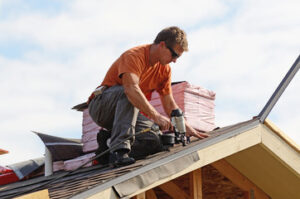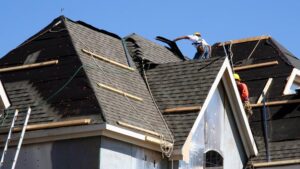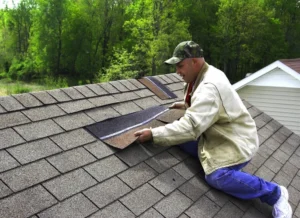When it comes to replacing a roof, you need a contractor who has the skills, experience, and expertise to get the job done right. A good roofing expert will be able to provide you with a comprehensive service that includes everything from design to installation.

Fresno Roofing Experts use contracts to ensure that all aspects of the re-roofing process are covered and handled correctly. They are also familiar with local regulations and insurance requirements.
Roofing experts are contractors that specialize in the construction and repair of residential and commercial roofs. They provide advice and consultation on matters pertaining to roof engineering, built-up roofing, single-ply membranes, metal roof systems, and skylights. They also offer expertise on mold, mildew and moisture-related issues, as well as roofing defects. Besides, they can help with repair cost analysis, site investigations, estimations, and other legal services.
Unlike general contractors, roofing specialists are experienced in all aspects of re-roofing projects. This includes ensuring that all materials are properly installed and that the project is completed in accordance with the building code. They are also familiar with local construction laws and zoning regulations. Moreover, they know how to navigate the complicated re-roofing process without any complications or delays.
Roofing experts are also better equipped to handle the different responsibilities associated with re-roofing a home, including taking care of permits and insurance requirements, and conducting thorough inspections after completing the job. They are able to anticipate problems and address them promptly to prevent additional expenses. Additionally, they can provide you with a warranty on their work, which is an important consideration for anyone looking to hire a roofing contractor. The best roofing companies will have a strong track record and good customer reviews.
They are more trustworthy
If you want to know whether a roofing contractor is trustworthy, start by asking them for references. If they are not willing to offer you any, that is a red flag and should be avoided. Also, they should be able to quickly produce their license, certification and insurance policies. If they can’t, that is a sign that they are either too new to be legitimate or hiding something.
Another way to determine if a roofing company is trustworthy is to check their online reviews and ratings. If they have a large number of positive, no-complaint ratings from local customers, that is a good indicator. In addition, you should also look for reviews from the Better Business Bureau (BBB). If a roofing contractor doesn’t have any local references or BBB ratings, that is a red flag as well.
Lastly, it is important to consider the type of warranty that a roofing company offers. Some warranties cover only the materials while others cover both the labor and the materials. A contractor should be able to explain the differences between different types of warranties and how they will affect the cost of your roof.
Lastly, homeowners should always get a written estimate before hiring a contractor for any work on their home. Many homeowners call what they think is a roofing company for an estimate and instead get a middleman or someone without any hands on roof installation experience at all. The main reason these scammers avoid giving you a written estimate is because they want to take over your insurance claim from the beginning and keep all of the money for themselves. They will often charge your insurance company for things they add to the estimates that are not required by the insurance policy.
They are more accountable
When you hire a roofing contractor, you want to make sure they are accountable for their work. This means they will provide a warranty on their work and be available to answer any questions you may have. They will also take the time to make sure that their work is done properly. If they don’t do this, then you could have a problem with the work later on.
Roofing experts know how to communicate effectively with insurance agencies. They understand the terms that insurers use and can complete paperwork without errors. This ensures a smooth process and eliminates frustration for homeowners and insurance adjusters. In addition, they have a clear understanding of what constitutes roof damage and can accurately assess the cost of repair.
The best roofing contractors will be able to provide you with a written estimate upfront. They will be focused on preparing estimates that are honest and accurate, not trying to maximize the homeowner’s insurance claim. Many shady contractors will add products and charges to your insurance estimate that are not necessary, just so they can get more money from the insurance company.
It is important to find a roofing expert that has all of the proper licenses and insurance requisites for their business. Additionally, they should have a strong reputation in the community and a lot of reviews on Google. They should also be a member of reputable trade associations. This will give you a good idea of the type of work they do and the quality of their workmanship.
They are more affordable
If you are looking for an affordable roofing contractor, look beyond just comparing quotes. Check for local referrals, social media reviews, and the Better Business Bureau to avoid contractors that aren’t reputable or transparent with their pricing. You also want a company that is licensed in your area and has workers’ compensation and liability insurance to ensure you aren’t being taken advantage of. VIS Exterior is an excellent example of a company that has both of these things and can provide proof of them upon request.
Roofing experts have the ability to work within a budget and make sure the job is done right the first time. They will not cut corners or use subpar materials to keep costs down and will stand behind their work by providing a warranty. They will also be able to shepherd the project through the required inspections and paperwork to complete the job efficiently and legally.
Cheap contractors will usually hide fees that they know you will be unaware of, such as additional labor costs and hidden fees in the contract. This can result in a higher overall cost for the project and may require you to have your property reroofed again in the future.







